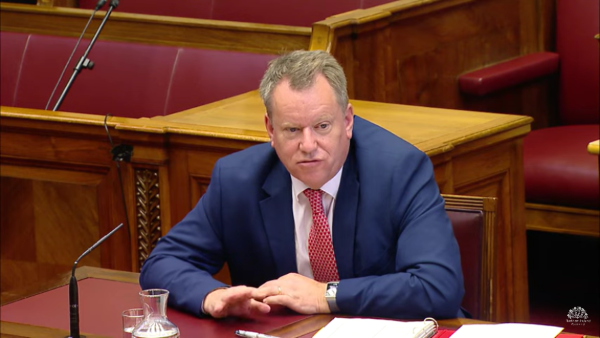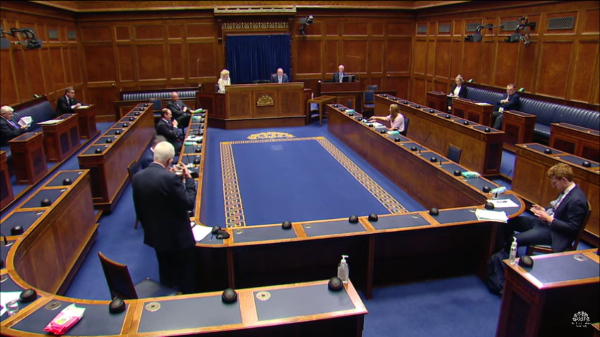Brexit & Beyond Newsletter
14 July 2021
 Welcome to the 14 July 2021 newsletter
Welcome to the 14 July 2021 newsletter
Lord Frost was at the NI Assembly on Friday to give evidence to the Committee for the Executive Office. The UK Government intends to set out its approach on the Protocol to Parliament before the summer recess. The Northern Ireland Affairs Committee heard evidence from women’s groups and community representatives. The Protocol and related solutions was debated in the Assembly.
**Please note that the Brexit & Beyond newsletter will not be issued weekly during the summer recess months.**
Lord Frost gives evidence to the Executive Office Committee
Lord Frost, the UK’s Brexit Minister, appeared before the Committee for the Executive Office on Friday 9 July. This followed an appearance by his EU counterpart Maroš Šefčovič the previous week.
Frost said UK-EU relations are “a bit tense at the moment” and that if the “highly unusual situation” of the Protocol on Ireland/Northern Ireland is going to work, “it's got to work in a pragmatic and proportionate way; it can't be treated as just any other external border of the single market.” Frost argued that the Protocol is a “balance” and a “purposive document…you have to read all the provisions together.”

Lord Frost addresses the Committee in the NI Assembly | Source: NI Assembly
Frost was asked if the UK Government considers free trade agreements with third countries to be of greater importance than dealing with East-West SPS checks. He said they are of “similar levels of importance”. He noted that the UK Government is “accused of being ideological” on the matter, but that “it seems to me equally ideological to say the only solution is you adopt our [EU] laws”. Frost went on to say that the UK does “definitely aspire in the future to do different things in the broad agri-food area” and that “we absolutely are going to maintain high standards and high scientific rigor.” He said the issue was fundamentally about sovereignty rather than standards. Asked about the reorientation of supply chains to local businesses under the new arrangements, Frost agreed that “the local product is just as good, but obviously that’s not really the point”.
Frost said they are studying the EU proposals on medicines carefully, saying, “it’s not quite clear that it solves the entirety of the problem”. His Cabinet Office official added that detailed discussions on the matter are now happening very quickly. In relation to the EU’s announcement about solutions on issues such as guide dogs and the movement of animals, Frost said, “we do have to talk about them, it isn't enough just to come out at a press conference and say we've got a solution and expect that that will end the discussion”. He said the UK has put forward papers on solutions for all these areas and they haven’t had a reaction to most from the EU. He said there needed to be a “better quality of discussion” if the problems are going to be resolved.
Pat Sheehan (Sinn Féin) said he was glad Frost was talking about the Protocol being improved rather that done away with. Frost said “there always will be the need for a treaty relationship between us and the EU covering Northern Ireland” but added “it’s the content that is the thing that needs talking about.” Frost said the consent mechanism is “an albeit imperfect way” of allowing the NI institutions to give their view. He said he thinks this mechanism is “fundamental to the workability of the arrangements”.
The previous day (Thursday 8 July) Lord Frost and Secretary of State for Northern Ireland Brandon Lewis spoke at the Policy Exchange think tank. They announced that the UK Government will set out its approach on the Protocol to Parliament before the summer recess on 22 July.
Boris Johnson at the Liaison Committee
Prime Minister Boris Johnson appeared before the Commons Liaison Committee (which is made up of Select Committee Chairs) on Wednesday 7 July. The session focused on COP26, the pandemic, and Post-Brexit impact. Johnson said that “the problem is the EU is currently trying to implement the protocol in a way that is grossly disproportionate and unnecessary.” On the constitutional position of Northern Ireland, he said “there is absolutely no threat to Northern Ireland’s place within the United Kingdom.” He said it was “an act of neighbourliness” to look after the EU single market and that this has been a “massive effort by the UK”.
NI Affairs Committee hears from women’s groups
The Northern Ireland Affairs Committee on Wednesday 7 July heard evidence from women’s groups and women involved in peace building as part of its inquiry on Brexit and the Northern Ireland Protocol. Elaine Crory, Good Relations Coordinator at the Women's Resource and Development Agency, outlined people’s concerns in relation to Brexit: “It was not so much the concept of Brexit or of the protocol. It was the uncertainty and the worry that it might lead to more unrest.”

Eileen Weir speaking to the Committee | Source: UK Parliament
Eileen Weir, Network Coordinator at Shankill Women's Centre, summarised the issue from her perspective: “The protocol needs fixing. It is not good in parts, but we are only hearing the negative; we are not hearing the positive. Our communities need to have some positive language coming out.”
Weir said that many in the loyalist community don’t understand the Protocol or the implications of single market access. This sentiment was echoed by Crory who said that many people are saying they do not understand the Protocol and the implications of EU-UK talks for their community and identity in the long term. Kate Clifford, Director at Rural Community Network, said people want to understand how the Protocol will affect them.
Louise Coyle, Director at Northern Ireland Rural Women’s Network, added that most citizens have very little understanding of the Protocol, and there is still a prevailing narrative in the media and elsewhere that it can be renegotiated or dispensed with. She said there is an onus on political representatives to clarify what it is, its function, and what can be adjusted: “It needs to be clear, honest and unambiguous and, to date, it has not been any of those things. That negligence of communication has allowed those with other agendas to utilise that lack of existing knowledge that is out there.”
Protocol debated in the Assembly
On Monday 5 July, Stewart Dickson (Alliance) made a statement in the Assembly on EU-UK relations and solutions to the implementation of the protocol. He said the agreement to extend the grace period for chilled meats “was significant because it was the first indication of a serious engagement between the two parties to recognise the difficulties that Northern Ireland finds itself in as a result of the outworkings of the protocol.” Christopher Stalford (DUP) said that matter is “not purely an economic issue; it is a constitutional issue. The constitutional position of Northern Ireland has been fundamentally undermined and threatened by the protocol.”

Stewart Dickson making his statement to the Assembly | Source: NI Assembly
Caoimhe Archibald (Sinn Féin) said the extension was a welcome temporary relief for business but said, “we need to see progress made between now and then to put in place permanent solutions in order to provide the type of clarity, certainty and stability that businesses are telling us that they want and need.” Matthew O’Toole (SDLP) said NI now has a competitive advantage: “We have an opportunity, which is unique on this planet, to move goods and to seamlessly export into the British market and the European single market of half a billion people.”
Jim Allister (TUV) said, “this is an issue of sovereignty, not sausages. A mere tinkering with the protocol, the grace periods and all the rest does nothing to affect the obnoxious and pernicious substance of the protocol.” Rosemary Barton (UUP) said the protocol was introduced through “a totally undemocratic process” and raised the issues with pets, importing plants, and difficulties for the agricultural community. She said, “The protocol has got to go. It is impacting on everybody in Northern Ireland, and there is no need for it.”
Other news
- The UK Government has announced the Movement Assistance Scheme will be extended and expanded for traders moving agri-food from GB to NI. The Movement Assistance Scheme covers certain certification costs involved with moving agri-food products.
- The Seanad Special Select Committee on the Withdrawal of the UK from the EU has published an interim report on the impacts of Brexit. The Committee recommends continued engagement with all parties in Northern Ireland. Regarding the democratic consent mechanism, the Committee “is of the strong view that a positive vote to maintain the Northern Ireland protocol cannot be taken for granted”. The Committee acknowledges “the differing political views arising from the Protocol on Ireland and Northern Ireland” and thinks “the full value of the Protocol has yet to be seen and that in order to address many of the trade issues arising, the Protocol must be fully implemented.”
- The Northern Ireland Affairs Committee has published the government’s response to its report on cross-border co-operation on policing, security and criminal justice after Brexit. The Government says it has been “cooperating with EU Member States via the new arrangements since 1 January, and the indications so far are that, in general, the new arrangements are working well in practice.” The report and response covers data adequacy, criminal record data, bilateral cooperation with Ireland, information sharing systems, and extradition arrangements.
- The European Scrutiny Committee has published the government’s response to its report on the work of the EU-UK Joint Committee. This covers ‘at risk goods’, the UK Trader Scheme, the EU-UK Withdrawal Agreement arbitration panel, and EU state aid rules.
- The Northern Ireland Chamber of Commerce and Industry published its quarterly economic survey on 7 July. It finds that 67% believe that NI’s status after Brexit presents opportunities for the region. Ann McGregor, Chief Executive of the NI Chamber said that while Brexit has been challenging for companies, “this survey shows that ultimately, businesses see the benefits of Northern Ireland’s unique position. They now need the support of a stable government to capitalise on the opportunities.”
- RTÉ reports that the UK is liable to pay the EU €47.5 billion under the Brexit financial settlement. This sum relates to outstanding EU spending commitments, as well as pensions for retired EU staff.
This Week at the Assembly
The Assembly is in recess until 5 September 2021
Catch up with the Committees
- Monday 5 July, 2pm – Plenary - Question Time – Finance; Health
- Wednesday 7 July, 11am - Committee for the Economy - LCM - Subsidy Control Bill
- Thursday 8 July, 10.05am – Committee for Health - Ministerial Briefing with Mr Robin Swann, Minister of Health; EU Exit legislation
- Wednesday 8 July, 10.05am - Committee for Agriculture, Environment and Rural Affairs - Written Briefing from DAERA on EU Exit legislation; Written Briefing - Common Frameworks
- Friday 9 July, 2pm - Committee for The Executive Office - UK Exit from EU - Briefing on the current and future workings of the Protocol on Ireland/ Northern Ireland with The Rt Hon Lord David Frost CMG



